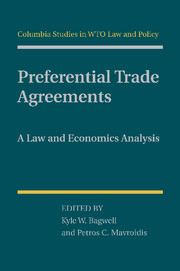Book contents
- Frontmatter
- Contents
- Contributors
- Introduction: The Law and Economics of Contingent Protection
- 1 Preferential Trading Agreements: Friend or Foe?
- The “Legalization” of GATT Article XXIV – Can Foes Become Friends?
- 2 Third-Country Effects of Regional Trade Agreements
- 3 Contingent Protection Rules in Regional Trade Agreements
- 3.1 Commentary on “Contingent Protection Rules in Regional Trade Agreements”
- 4 The Limits of PTAs
- 5 EU and U.S. Preferential Trade Agreements: Deepening or Widening of WTO Commitments
- Straightening the Spaghetti Bowl
- 5.1 Comments on “Beyond the WTO? Coverage and Legal Inflation in EU and U.S. Preferential Trade Agreements”
- 6 Labor Clauses in EU Preferential Trade Agreements – An Analysis of the Cotonou Partnership Agreement
- 7 Do PTAs Actually Increase Parties' Services Trade?
- 8 A Model Article XXIV: Are There Realistic Possibilities to Improve It?
- 8.1 Comments on “A Model Article XXIV: Are There Realistic Possibilities to Improve It?”
- Index
The “Legalization” of GATT Article XXIV – Can Foes Become Friends?
Published online by Cambridge University Press: 03 May 2011
- Frontmatter
- Contents
- Contributors
- Introduction: The Law and Economics of Contingent Protection
- 1 Preferential Trading Agreements: Friend or Foe?
- The “Legalization” of GATT Article XXIV – Can Foes Become Friends?
- 2 Third-Country Effects of Regional Trade Agreements
- 3 Contingent Protection Rules in Regional Trade Agreements
- 3.1 Commentary on “Contingent Protection Rules in Regional Trade Agreements”
- 4 The Limits of PTAs
- 5 EU and U.S. Preferential Trade Agreements: Deepening or Widening of WTO Commitments
- Straightening the Spaghetti Bowl
- 5.1 Comments on “Beyond the WTO? Coverage and Legal Inflation in EU and U.S. Preferential Trade Agreements”
- 6 Labor Clauses in EU Preferential Trade Agreements – An Analysis of the Cotonou Partnership Agreement
- 7 Do PTAs Actually Increase Parties' Services Trade?
- 8 A Model Article XXIV: Are There Realistic Possibilities to Improve It?
- 8.1 Comments on “A Model Article XXIV: Are There Realistic Possibilities to Improve It?”
- Index
Summary
Introduction
It was a pleasure to have the opportunity to appear at the Columbia Law School seminar on regional trade agreements and to provide comments on the theme of whether regional trade agreements (RTAs) are “friends or foes” of the multilateral trading system. I am also grateful to have Alan Winters' most thorough review of the economic issues regarding RTAs in hand – even though as a lawyer I am also poorly qualified to make comments on most of his points.
At the same time, there are themes raised by Winters that allow me to suggest a complementary legal theme for this seminar subject. This first discusses how Article XXIV has gradually achieved a certain degree of “legalization” within the WTO system and then raises for your consideration how this more legalistic application of the regional exception may bear on the question of whether RTAs are “stumbling blocks or building blocks” in the multilateral trading system. The results of dispute settlement cases in the WTO are tending to show that the regional exception is more narrow than many regional members once believed it to be – that higher degrees of regional trade liberalization are required to form a qualified RTA, and that the burden of demonstrating whether regional members have satisfactorily eliminated their duties and other restrictive regulations of commerce is upon them.
- Type
- Chapter
- Information
- Preferential Trade AgreementsA Law and Economics Analysis, pp. 31 - 39Publisher: Cambridge University PressPrint publication year: 2011
- 2
- Cited by

